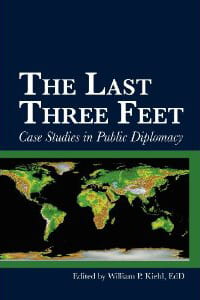WASHINGTON – Public diplomacy is the focus of a new series of the Center on  Communication Leadership and Policy forums that launched last week on August 30th, in Washington D.C.
Communication Leadership and Policy forums that launched last week on August 30th, in Washington D.C.
The first program, “The Last Three Feet: Case Studies in Public Diplomacy,” was devoted to efforts by the U.S. to establish personal relationships with publics overseas and drew on contributors to the recently published book titled by the same name. The latest book in the Public Diplomacy Series published by the Public Diplomacy Council is now available on Amazon.com, both in paperback and as an e-book.
Jean E. Manes, Staff Director for Resources for the State Department, had returned from her post in Kabul just hours before her appearance at the forum, and she expressed frustration with sometimes ineffective use of social media as a public diplomacy tool.
“We couldn’t even get our own embassy people to ‘like’ the embassy web site,” she said. But a concerted effort brought more attention to Facebook and other social media – including from U.S. embassy officials – increasing the effectiveness of America’s digital outreach to the Afghan public.
Paul Smith, the new Director of the British Council in Washington D.C., had also just arrived from his prior post in Kabul, and he spoke briefly from the audience, saying that for the British, too, Afghanistan is “still a topmost foreign policy” priority.
John R. Beyrle, former U.S. ambassador to Russia, was another presenter; he said one of his priorities in his tours in Moscow had been to get the attention of the Russian people, not just their leaders.
“At the end of the day,” said Beyrle, “there is no effective substitute for face-to-face contact between two people.”
As evidence, the ambassador recalled meeting a Russian official who showed him a brochure from an American exhibit three decades earlier in what was then the Soviet Union. The ambassador said the official was just ten years old when he visited the U.S. exhibit, but he had always kept the brochure – and a hand-written note “in pretty good Russian” given to him by an American – as a prized souvenir.
The U.S. should devote “our best minds and whatever money we can” to these people-to-people programs, the ambassador said.
Last week’s forum was presented in partnership with the USC Center on Public Diplomacy and the Public Diplomacy Council. the forums will take advantage of their location in the nation’s capital to draw on presenters and participants from the U.S. government and from embassies here.
The CCLP public diplomacy series continues in the fall with programs covering such subject as international broadcasting and the U.S. presidential election.